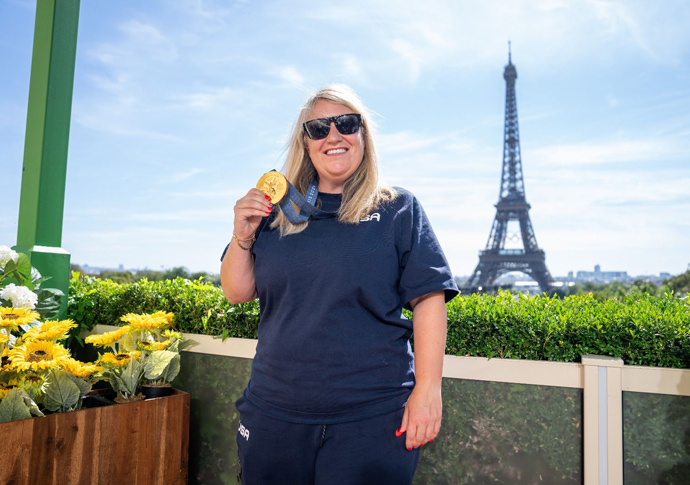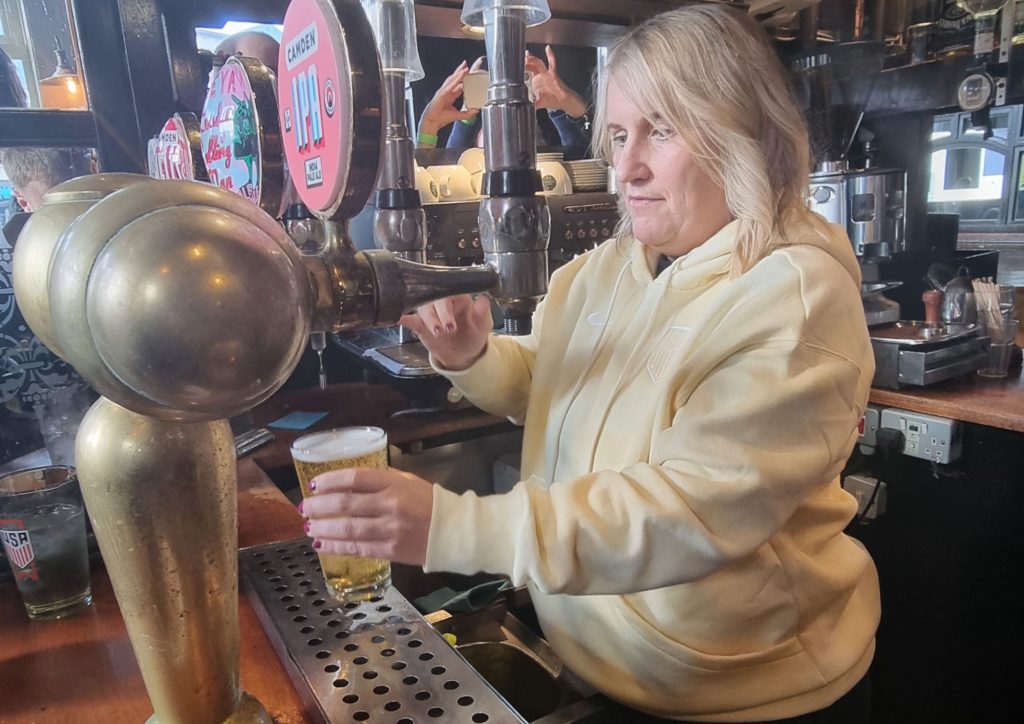US boss: Don’t let social media take over your life
As women's football rises in popularity, so does the online pressure on the players
Tuesday, 11th March 2025 — By Caitlin Maskell

Emma Hayes with her Olympic gold medal
This article was published in our ‘Stop The Trolls’ special for International Women’s Day 2025
ONE of the most pivotal figures in the popularity breakthrough of women’s football has told the New Journal that social media is here to stay and players will have to find healthy ways to deal with it.
Emma Hayes, the manager of the United States national team, said: “I’m not saying to players that they shouldn’t interact with social media but to learn how to avoid things around them that may be toxic.
“I always strongly advise that you can still exist without it touching your world.”
Ms Hayes, who grew up on the Curnock Street Estate in Camden Town and went to Parliament Hill School has come a long way since summers spent in her youth running sports sessions for kids at Coram’s Fields in King’s Cross.
Her successful career has seen her serve as the assistant manager of Arsenal, win trophies in the top job at Chelsea and lead the United States to Olympic gold in Paris last summer.
Speaking to the New Journal for our International Women’s Day special, Ms Hayes said the relationship players have with social media in this generation is not an easy journey and one that is much harder than her own.
She said: “I’m the last of the generation that didn’t have social media during my teenage years so I’m comfortable without it.
“I can interact with it but it doesn’t dominate my life. I didn’t have to grow up as a teenager where everything is judged – in the way that everything is now.
“You have to be so switched on. What I have seen is people have had to grow up quicker, in public, because anything from a night out can be misconstrued or your response or your reaction to something revealing may be what you’re feeling emotionally.”
Ms Hayes added: “I’ve seen how the generations have had to deal with their relationship with social media and their interactions with it to the point where they can’t interact with it any more.
“To some extent when negative experiences happen it takes the spell away from social media. Then when people rejoin it they do it on the terms that work for them.
“I always say to people we’re in a business where you are front and centre and there are a lot of great moments that come with the territory but there are also a lot of negative ones.
“And those negative ones aren’t necessarily indicative of what everyone feels but that’s the reality that we live in where we’re being judged.
“I think it plays with people’s emotions in a way that I never had to experience. I’ve seen a lot of players suffer throughout my career. For example the increasing pressure post-2022 Euros.
“Did the pressure and social media attention on women football players increase? Absolutely. The ‘Sky Sportsation’ of the game has intensified so that we are all – including me – are constantly in the media’s eye.

Camden Town born and bred Emma Hayes held a press conference at the Underworld last year
“I’m grateful I never had to go through that in my early years and as a result my self-esteem is higher and healthier. Whereas younger people don’t know anything but the world of dopamine fixes and that in itself is a challenge.
“I think there needs to be a world in which we are rehab–ing from social media much like people do from alcohol. “There are very unhealthy elements of social media that feed our psyches and one thing I say to the athletes all the time is to choose the interactions they have with it, and if they’re using it to make themselves feel better or validated that is not as healthy.”
Data published by Fifa after the Women’s World Cup in 2023 said that one in five players were targets of online abuse.
It found that 152 players out of 697 whose social media accounts were actively monitored received targets of discriminatory, abusive or threatening messages during the final between England and Spain.
Ms Hayes said: “It’s much worse for women. We’re told our place is not in football. It’s a place for men only and our opinions are not welcome especially in the men’s football space.
“And we’ve been and are subjected to a lot, but I don’t want to take it away because I’m sure Saka had a really hard time just as much as James Madison might have the other week when Tottenham weren’t playing well.
“And then you get people like Joey Barton that encourage pile-ons – high profile people like him. That does not help the situation online, and it makes it not a great place for the players.
“But like I said, my approach is very healthy. I think you can’t control all these things, so disconnect from it and put your time and attention somewhere else.”
She added: “Online abuse of players has been quite well documented, from Lauren James to Fran Kirby. If they go through situations where they haven’t played very well or they don’t look a certain way or there is a poor team performance the online abuse can increase and I think is has been gradually increasing in the last few years.”
“But to be honest social media in general is a place that has become an established platform where you can say what you like to whom you like, whenever you like and hide behind a fake pseudonym. So I don’t think it’s just targeted at women you could probably find that across a lot of sports and as well as football.
“You only have to see anybody from Saka at the Euros to Bunny Shaw in more recent times – it’s not saved for one gender or one race. In some people’s worlds they believe it’s free speech. You can say what you like but the reality is that most people are hidden behind a pseudonym or a different name. It is something that’s there and it’s not easy to cope with.
“Personally I don’t give it much attention maybe because I’ve done it for such a long time and I know what to listen to and what not to, but that doesn’t make it any easier.
“There will be a lot of players that have been subjected to it time and time again.”
But combating online abuse in women’s football remains an issue, partly due to funding.
Ms Hayes said: “Some clubs are well resourced but in other places there might not be as much available help.
“And again we’ve got a Women’s Euros this summer with the chance again of getting even further and it’s not an easy place for a lot of women where you’re being constantly criticised about the way you look and the way you play being in a sport that in the eyes of some is a sport for the few, and to be spoken about by a few.
“My whole feeling on this is tough. We’re here and I’m going to talk about it.
“You have to have coping mechanisms and mine is shove it off when you know it’s becoming toxic; seek help and ask for help and have a healthy relationship with social media where you can dip your toe in and out of it when it suits you.
“In the future, sadly I think it will be much of the same. I think we live in a very polemic world right now, a polarising place. It’s not healthy but it’s not one that is going to get any easier. It’s all about how you manage your relationship with that and keep your confidence in a good place.
“I can spend time moaning about it, but the reality is social media is there, it exists, we have to live with it and what it generates, and you have to find a way to have a healthy relationship with it.”